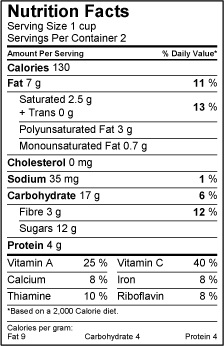|
How many people look at nutrition claims on the front of food product labels when at the grocery store? Now, how about looking at the back of the packaging for nutrition facts tables and ingredient lists? Food labels serve the purpose of giving basic information about the characteristics of a product to the consumer, providing information pertaining to nutrition and health, presenting safety instructions for safe handling and storage, and acting as an advertising and promotional tool. Any information that appears on a food labels must be truthful, including the accuracy of ingredients lists in descending order of proportion, nutrition facts labels reflecting correct nutrient amounts in product, precise net quantity declared, and nutrition claims. We all can imagine what food labels look like.  Something consumers may not be aware of, is front-of-package labels act as a marketing tool for food manufacturers. Claims that appear are often given the term “health claims” despite that lack of formal recognition by government food regulatory departments. The general definition for claims by Health Canada that will be used for this paper is, “any representation in labeling and advertising that states, suggests, or implies that a relation exists between the consumption of foods or food constituents and health”. Manufacturers in recent years have had an increasing interest in using health claims. Not only do these health claims act as marketing tools, but act as educational tools to inform the public. With the growing focus on evidence linking diet, nutrition and health, consumers are becoming more aware of approaches to enhance their health, taking responsibility to make better food choices. Diet is one of the major contributing factors affecting the incidence and severity of diseases such as diabetes, coronary heart disease, and cancer. A large portion of direct and indirect health care costs come from these diet-related diseases, placing an increased strain on the medical system. The primary purpose of claims is to better inform consumers, leading to healthier food choices and better overall diet quality, resulting in prevention of chronic disease and improved health outcomes. Evidence regularly shows that there is a high awareness of nutrition claims on labels. Consumer surveys show increased perceptions of the healthfulness of food items bearing claims. The unfortunate truth is that awareness of nutrition claims does not translate into full understanding of the information provided. Inconsistent and insufficient evidence is available on the power of nutrition claims on front-of-package labeling in modifying behaviour, food choice and intake. Usage of front-of-label claims are impacted by many factors causing varied usage, including mood, time pressure, social pressure, type of product being purchased, cost, interest in nutrition, motivation, health state, literacy, and understanding of claims/ nutrition. These factors may explain why the chain of effects leading to the ultimate goal of healthier diets and obesity prevention may not be plausible.  Evidence shows that claims can lead people to categorize food as good or bad for their health. This thought process causes people to underestimate the number of calories in foods thought to be good for health, while overestimating calories in less healthy option. Individuals therefore give good foods a “health halo”, effecting the quantity consumed, resulting in overconsumption. Nutrition claims may also cause the consumer to look at individual nutrients and not foods as a whole. Claims may not be appropriate if usual consumer serving size is different from the standardized portion listed on the nutrition table. Nor do these claims provide direction on frequency of consumption of a food item in the context of the whole diet. Recent use of claims in combination with other front-of-label designs to disseminate healthfulness of a food product can be very confusing for the public. Since the use of claims on labels is voluntary, it does not guarantee the provision of valid information. As a general trend, the food industry has a tendency to highlight the good qualities of a food product, while neglecting the negative attributes, such as a food bearing a low-fat claim but is high in sodium. In Canada, the increased use of nutrition claims on food products offer the potential to change consumption. It has already been proven that nutrition claims have caused increased consumer awareness, offering a convenient way for consumers to make healthy choices. Nutrition claims offer the potential to remove barriers to eating healthy by simplifying nutrition information on labels, making it easier to understand. Much of the population’s food preference is learned and therefore can be modified through exposure and modeling. Although the downside of claims exist, learning how to read labels and understand information provided pose the potential to change food choices and eventual preference.  Alysha Coughler, RD, MSHc, PTS Sports Dietitian at Evolved Sport and Nutrition
5 Comments
31/1/2017 12:11:27 am
Health Canada is offering to introduce mandatory front-of-bundle (FOP) labeling requirements for ingredients high in vitamins of public health difficulty - sodium, sugars and saturated fats - because of immoderate intakes. Thanks for this great writing, I am looking forward to this type of article.
Reply
18/5/2017 04:57:40 am
Etiquette of nutrition is a very important task for every person and country, since everyone is interested in healthy people.
Reply
4/4/2023 02:56:33 am
Why are you still writing on the internet? Why don't you write a book when you're really good at writing like this crazy person? It's a waste of your talent to just be in this space.
Reply
7/8/2023 01:50:29 pm
Thanks a bunch for one more valuable post. Ive been checking this website frequently for the past number of months, and its currently one of my favorite sites.
Reply
8/8/2023 01:50:09 pm
Thanks for Your article…It gives us immense knowledge. Body massage gives you ultimate relief to your body. I would like to recommend each and everyone go for massage once in a week for ultimate relief. it will not only gives you relief but also increase your productivity.
Reply
Leave a Reply. |
Categories
All
Archives
November 2021
|
- Home/ News
- About
- Services/ Store
- Media
-
Learning Center
- ESN Athletic and Healthy Lifestyle Learning Center >
-
Professional Learning Center
>
-
The ESN Sports Nutrition Certificate
>
- ESN Learning Center - Sports Nutrition Certificate Level 1 >
- ESN Learning Center Sports Nutrition Certificate Level 2 >
-
ESN Learning Center - Sports Nutrition Certificate Level 3
>
- Module 1 - Periodization for the Athlete
- Module 2 - Nutrition Strategies to Optimize Recovery
- Module 3 - Sports Nutrition for Children and Young Athletes
- Module 4 - Sports Nutrition for the Aging Athlete
- Module 5 - Nutritional Strategies for Injury Prevention and Concussions
- Module 6 - Nutritional Strategies for the Travelling Athlete
- Module 7 - Tournament Nutrition Strategies
-
The ESN Sports Nutrition Certificate
>
- Contact
Proudly powered by Weebly

 RSS Feed
RSS Feed